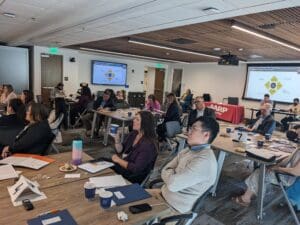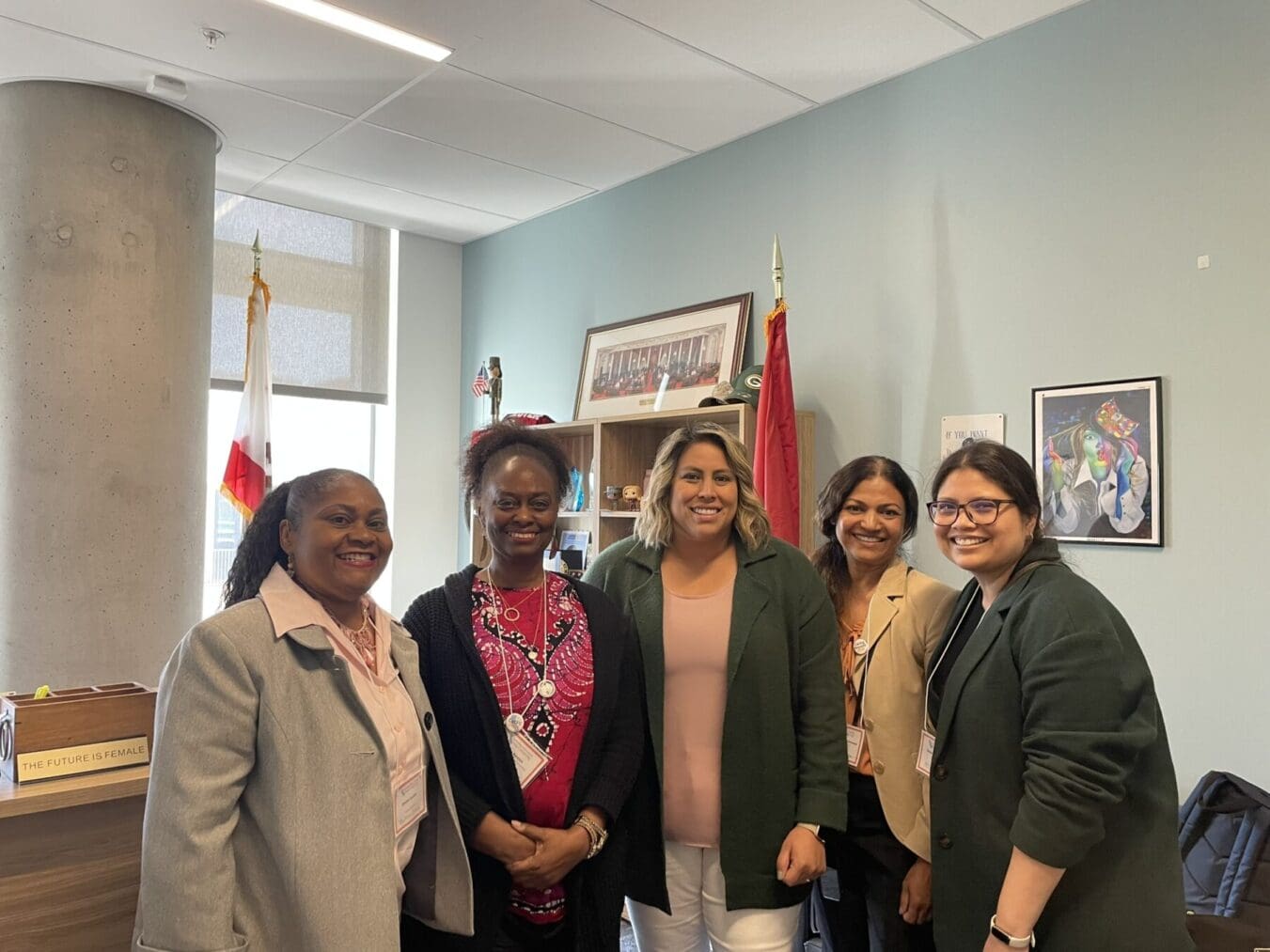The Sacramento Area Council of Governments office was abuzz with activity on April 30, as it hosted the Caregiver’s Journey: The Roadmap to 2030, a conference and advocacy day organized by the California Coalition on Family Caregiving (CaCFC).
More than 40 caregivers, advocates, and policymakers came together to discuss and plan for the future of caregiving in California. Anticipating the significant demographic shift expected by 2030, the title of the conference emphasized how about 20 percent of the U.S. population would be 65 or older. Launched in 2022 by Donna Benton, research associate professor of gerontology and director of the USC Family Caregiver Support Center (FCSC), CaCFC aims to advocate for California policies and services that support diverse unpaid family caregivers and their care recipients.
“Our hope is that the coalition will eventually have the capacity to sponsor or co-sponsor our own caregiving bill and to be a vehicle for greater visibility of the work and needs of family caregivers, as well as a space of connection,” said Jenna Shankman, coalition coordinator and policy specialist.
The morning session started with opening remarks from Benton, who highlighted the urgent need to prepare for a future where a quarter of California’s population will be over 60.
“We have been talking about aging and how we need to plan for aging, but we have only 6 years to continue on this road, and of course, after 2030, we’ll still be working,” Benton said. “But we would like to see some of the things laid out, so that by 2030, you’ll be ready to care for your parents.”
Juan Carlos Guerrero, manager of regional organizing of Caring Across Generations, followed with a recap of the coalition’s first-year achievements, including the passage of SB-616, which expanded paid sick days in California. Guerrero also introduced the coalition’s 2024 priority bills, emphasizing the importance of these legislative efforts in supporting caregivers statewide.
“As we approach 2030 and beyond, it is key that we continue to advocate for the restoration and expansion of these services, so that aging families have the resources available to comprehensively provide and receive care in their own backyard,” Guerrero said.

The conference portion of the day’s events included discussions on potential legislation regarding caregiving.
Among the attendees was Deidra Gossett, a caregiver advocate whose personal journey highlighted the importance of such events. “I’m the primary caregiver for my 79-year-old mother diagnosed with dementia. I received an email through USC Caregiving Support Center looking for volunteers. So, I applied and was able to attend,” shared Gossett, who also connected her advocacy to her experiences at the USC Family Caregiver Support Center. “These meetings let me know that I’m not alone in this journey. Being both a caregiver and now an advocate has put a different perspective on my life.”
A highlight of the event was the special address by Chris Langston, CEO and President of Archstone Foundation. Langston discussed the foundation’s commitment to caregiving and showcased the significant progress made through their funding. Sarah Steenhausen, Deputy Director of Policy, Research, and Equity at the California Department of Aging, provided an update on the state’s Master Plan for Aging (MPA), focusing on key areas such as systems change, financing, and workforce initiatives.
As a caregiver for both his parents and his children, Langston said, “You need the real life experience that you can share with policymakers and the public that help them understand what the reality is and what people are going through.”
A panel discussion, moderated by Dr. Nina Weiler-Harwell of AARP California, featured insightful contributions from experts including Liz Fuller from the California Assembly Aging and Long-Term Care Committee, Katie Duberg from the California Work and Family Coalition, and Kate Hoepke from Village Movement California. The panel addressed critical issues such as advocacy strategies, policy advancements for paid family leave, and support for middle-income families, offering practical solutions. Weiler-Harwell, who received her doctorate in political science and government from USC, engaged the audience in a Q&A session with the panelists.
A significant part of the conference was dedicated to discussing the coalition’s priority bills and their impact on caregivers:
- AB 518 – Paid Family Leave for Chosen Family (Wicks): This bill aims to expand California’s Paid Family Leave program to allow workers to receive partial pay when caring for a “designated person,” who can be a member of their chosen or extended family. This expansion is crucial as the current law excludes many caregiving relationships, such as chosen family, unmarried partners, aunts, uncles, and cousins.
- AB 2428 – Community-Based Adult Day Services Medi-Cal Minimums (Calderon): This bill would require Medi-Cal Managed Care Plans to reimburse Community-Based Adult Day Services providers at a rate equal to or greater than the amount paid by the Medi-Cal fee-for-service delivery system. Immediate intervention is necessary to prevent further closures of these centers, which provide critical health and social support for older adults and respite for family caregivers.
Following lunch, the conference transitioned into an advocacy-focused afternoon. Participants, armed with legislative visit packets and clear talking points, headed to scheduled meetings with California legislators. These meetings were designed to build support for the coalition’s priority bills and to ensure that the voices of caregivers were heard at the highest levels of state government. Yasmin Peled, senior policy advocate with Justice in Aging, guided attendees to their appointments, emphasizing the importance of these engagements in shaping effective caregiving policies. The atmosphere was filled with optimism and a renewed sense of purpose, as participants left with a clearer roadmap for advocacy and action leading up to 2030.
Attendees met with the staff of over 20 California assembly members and senators, including Assemblymember Rick Chavez Zbur, Assemblymember Jim Patterson, and Senator Lola Smallwood-Cuevas.
Gossett found the day’s events particularly enlightening. “It was very eye-opening about how bills are supported by the public and how it’s very necessary for our experiences to help legislators vote,” she said. Looking ahead, she expressed her hopes for the coalition: “To continue to share information not only with each other but to all caregivers of California.”





